Aleksandra Kabala: “I found out for myself that indeed every student voice mattered”
|
13 Oct 2023|
13 Oct 2023Between 31st May and 2nd June 2023, the European Student Assembly (ESA) 2023 was held at the European Parliament in Strasbourg, France. ESA’s main goal was gathering students from most European University Alliances to debate current issues, draft political recommendations for the future of Europe, and advocate them among stakeholders and decision-makers.
Aleksandra Kabala, a student at the University of Wroclaw and member of the Arqus Student Council, represented the Arqus Alliance in this event. She also participated in Panel 8, “Cities of the future. How could sustainable cities contribute to European autonomy and people’s welfare?”.
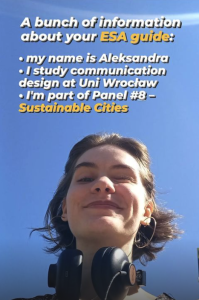
Aleksandra was also an excellent guide during the Assembly, and she covered the event on the Arqus Instagram account, sharing her experience with our followers. Now that the registration for the ESA 2024 is already open, we talked with her to encourage other students to participate in this meeting.
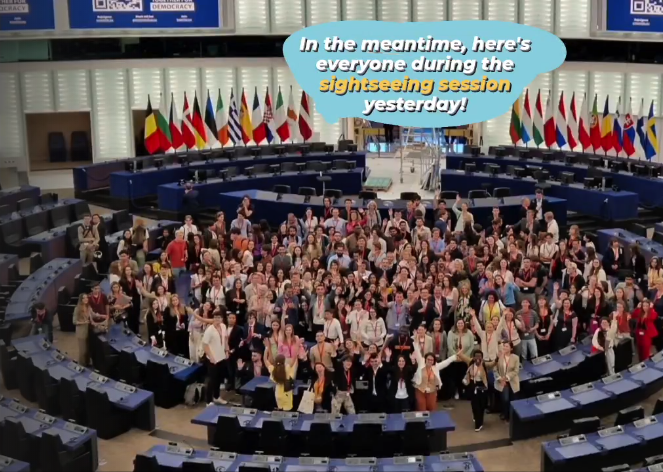
What motivated you to participate in the ESA with the Arqus Alliance?
At the time when applications for the European Student Assembly opened, I felt interested in the topic, but not particularly convinced that my possible contributions could be enough to apply. The scale of the event made me feel a bit nervous and its form, with what I thought would be panel discussions and public speaking, didn’t exactly play to what I considered to be my strengths. Luckily, my partner was there right in time to give me a speech about the importance of student contribution and about how determination and a passion for the topic were the most important things. He was right – I’m excited to have participated, found out for myself that indeed every student voice mattered, and to share this encouragement with other students in the future.
How did you prepare yourself for Panel 8 “Cities of the future”?
Each of the topic panels had a similar path to the ESA conference, although all of them differed in execution. Generally, after being accepted to the panel, all twenty of us met with our coordinators online in order to discuss the ideas we had in mind when applying and to get started with the organization of our work. The months between that meeting and June, when we finally all saw each other in Strasbourg, were spent on bigger and smaller calls, sharing readings and notes, exchanging insights, and attending sessions with domain experts who could answer our questions and guide us in the right direction with our proposals. A book that helped me a lot was “Happy City” by Charles Montgomery, which I recommend to anyone interested in the topic of making urban spaces livable!
What did you like the most about the Assembly?
There are a lot of answers I could give to this question because there were very many things to enjoy at the ESA. From bigger things such as the satisfaction of being part of policy drafting, to the smaller ones, such as how exciting it was to attend an event at the very seat of the European Parliament. Still, I think the thing I genuinely enjoyed the most was that the discussions about Europe didn’t stop with the meetings and instead kept going for a long time, during breaks and long after hours. In the halls of the Parliament just as well as at the hostel breakfast tables, you could hear young people from all over the continent, talking very passionately about their ideas on how to better the EU for all of us. I enjoyed that very much and listened in as much as I could.
What personal and professional objectives have you achieved with this experience? What is the most important learning you would highlight?
The ESA was unlike most of the projects I’ve taken part in so far and because of this, I went into it without any specific objectives outside of “learn as much as you can” and “contribute in ways that matter.” Still, looking back at it now, I can say that I learnt a lot about speaking up for good ideas, taking initiative where it’s needed, and – maybe the most – about giving and accepting constructive criticism. Panel 8 had a lot of fantastic ideas for making European cities better but only ten of them could be made into proposals. The selection process was difficult and many solid initiatives had to be discarded, even if their authors had worked very hard on them. The way we collectively managed to shift the focus from “my proposals” to “our proposals” and work towards delivering the best possible final product was a great learning experience for me.
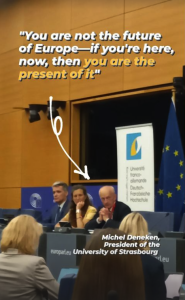
What is your vision of the future of higher education in Europe?
That’s definitely a question worth its own interview and I think it would be easy to go on for too long about this, so I’ll rather keep it short. What I hope for is a European higher education system focused on interdisciplinarity and collaboration across various fields; I hope for reskilling, upskilling, and life-long learning; and I hope for inclusivity and equity. I think that keeping these core ideas in mind, we can work together – as policymakers, educators, students, and stakeholders – to create a forward-looking, progressive, and inclusive educational ecosystem.
What are, in your opinion, the main challenges of Higher Education in Europe?
All of the challenges I could name – the integration of new technologies, diversity and inclusivity, addressing student mental health, quality assurance, financial sustainability – in my opinion fall under the umbrella of flexibility and adaptability. Universities, being by nature big institutions which are deeply rooted in their historic values, often struggle to meet the pace of changes in their environments. This is understandable and quite obviously dependent on a variety of factors and stakeholders, not just the universities themselves. Still, in my mind, bridging that gap remains at the core of any of the solutions that could be proposed to any of the challenges I listed above.
How can the students’ voices contribute to dealing with the current challenges of Europe?
As far as I’m concerned, students’ voices play a vital role in addressing the current challenges of Europe – as they have many times in the past. Universities are basically designed to be hubs of diverse idea exchanges and precisely because of this, students can bring to the table unique perspectives, fresh insights, and strong stances. All of those can be drivers of meaningful change and bring about novel solutions to the complex problems that Europe is facing. With the right facilitation coming from institutions which understand the role of students in driving social impact, this pressure for change can help address societal challenges well beyond our uni campuses. It is essential for educational institutions and policymakers to create platforms that facilitate open dialogue with students, ensuring their voices are heard and their contributions are valued. When students actively participate in shaping their education and society, the collective effort leads to a stronger, more inclusive, and future-ready Europe.
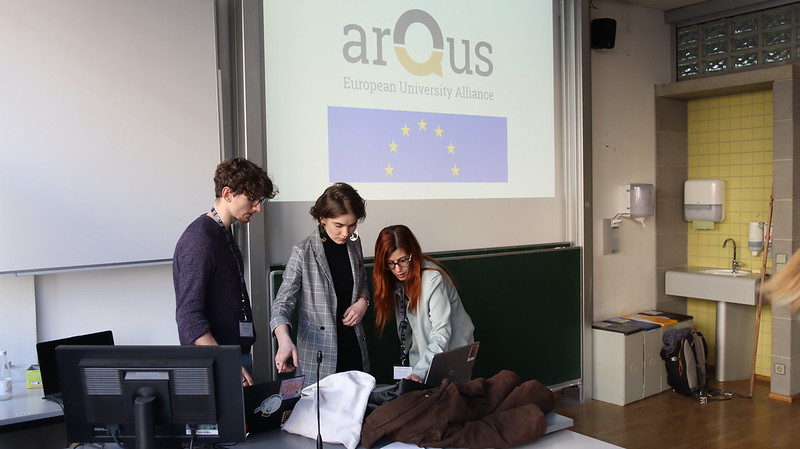
What raised your interest in Arqus?
I had already been involved in the work with international students at the UWr when the university joined the Arqus Alliance. Because of this, I had both the firsthand knowledge about international cooperation and the multicultural experience necessary to feel comfortable taking up initiatives such as the ones Arqus offers. Going for the post of a Student Council university representative felt like a natural extension of my work for the University of Wrocław and I’m very happy I was given the chance to participate.
What opportunities does being part of a European University Alliance such as Arqus offer you?
Well, for one, there’s participation in the European Student Assembly which I’d definitely recommend to anyone interested in EU issues. There are language cafes, conferences and summer schools; there are research opportunities; there are open calls for student projects (which, to whoever hasn’t heard yet: twice a year, student projects that involve more than one Arqus university can count on special funding from the Arqus Student Council!). There are ways to benefit and there are ways to contribute – and then benefit through that also. One of the best ways to get involved is of course the Arqus Student Council, which represents student voices of all of the universities in the Alliance. There, there’s even more opportunities for international cooperation, organizing cross-border projects, and connecting with students from other countries both online and in person, during the Annual Conferences. Definitely email them to ask about the opportunities to participate!
What would you say to other students about Arqus to encourage them to be an active part of the change in higher education?
I would say that whatever ideas they have about how to better their study experience, their universities, or their surroundings – there are people in Arqus who really want to hear those ideas. There is only so much the Alliance can do for students without the voices of these very students guiding it in the right direction, so it’s up to us to voice our concerns and get involved.
What has been your best experience as part of the Alliance so far?
The 2022 Annual Conference in Padua has definitely been the best part of it all. It changed my life in some ways.
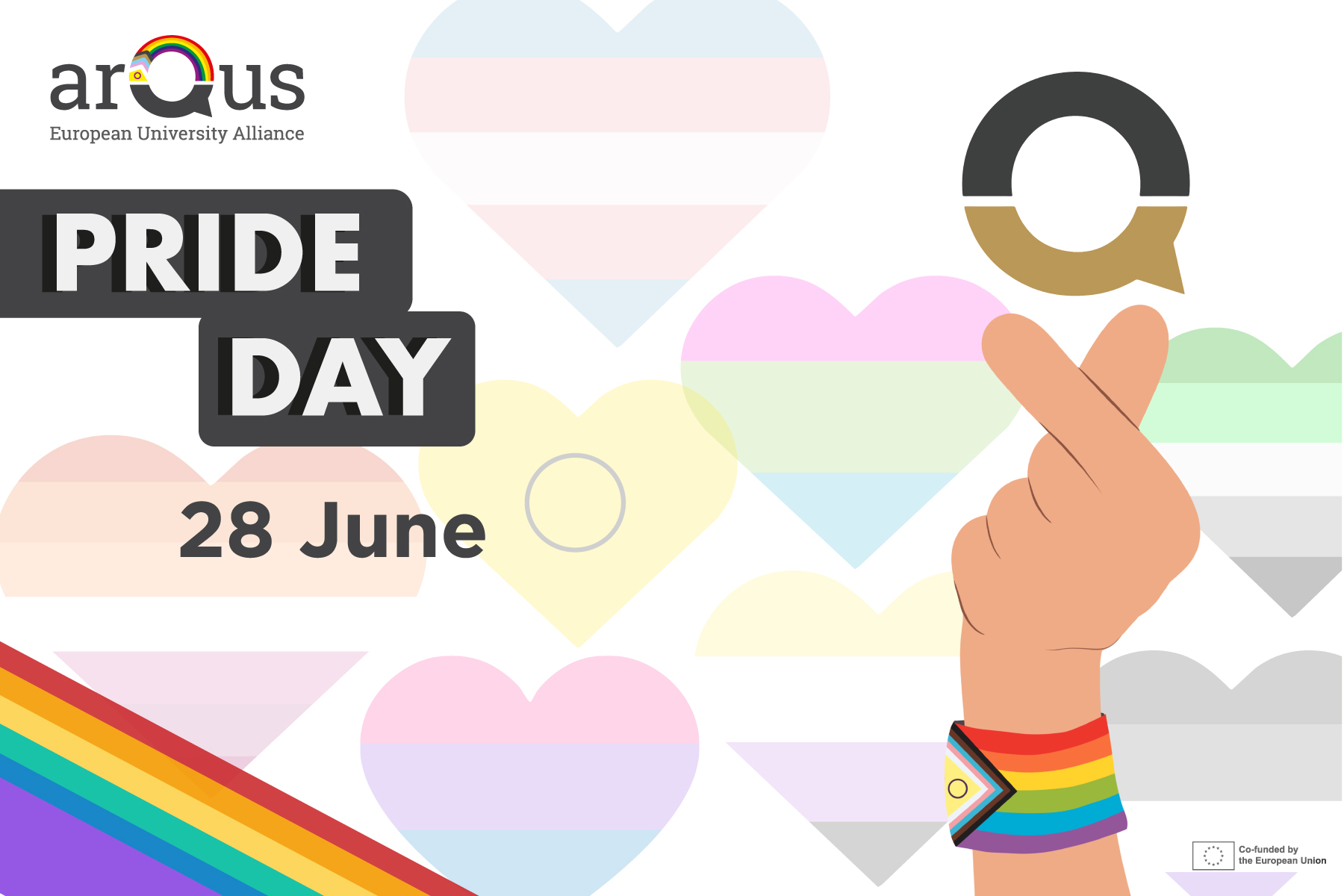
28 Jun 2025